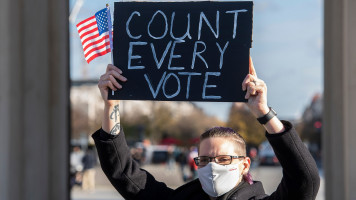Witnesses of unsolved Mosque-area shootings in Oakland still search for answers
It has been around three weeks since a fatal shooting near a mosque in the northern California city of Oakland, and neighbours are still looking for answers.
The incident happened by the corner of 31st Street and Telegraph Avenue on the evening of 21 September, shortly after prayer time. The three shooting victims, two of whom died shortly after, were in front of a nearby restaurant Layalina, around the corner from the Oakland Islamic Center, when a masked man in an unlicensed car fired shots.
"I want answers as much as anyone," Ramzey Mohamed, a cashier at Layalina, told The New Arab. "This happens every day. But not here, not in this part of Oakland," he added, noting the contrast between the area where he works and what he's seen in other parts of the city.
On a sunny October day, the neighbourhood looks quiet and pleasant. On the major thoroughfare of Telegraph Avenue, which straddles Oakland and Berkeley, are bakeries, grocery stores, restaurants, schools and churches as well as medical buildings in the area, the namesake of the neighbourhood's name Pill Hill. There's even an office of the California Highway Patrol with law enforcement cars parked outside, one of many indications of a secure area.
Closer to the mosque are businesses catering to immigrants from the Middle East, with signs in both English and Arabic indicating translation services and immigration legal assistance, as well as colourful grocery stores.
Until last month, there were no apparent indications that a shooting would occur in this community. So far, there are no motives for the shooting. However, based on the CCTV footage from Layalina, the assailant appeared to be targeting the 19-year-old Yemeni American, who survived his shooting, while the other two men who died are believed to be bystanders, Mohamed said.
Mohamed grew up with the teen who survived the shooting, both children of Yemeni immigrants.
He continued to go about his business taking orders as he talked about the incident. He went back and forth between shrugging and expressing shock at what had happened. He then pointed out multiple bullet marks that remain dented on the restaurant's windows, TV sets and refrigerator.
Another witness to last month's violence was Hatim Nasser, an immigrant from Yemen, who works as the mosque's translator. He had known the two deceased older men - 59-year-old Belal Esa, an Ethiopian - for more than 20 years and 27-year-old Asam Al-Awjri, a Yemeni for around four years. After hearing the gunshots, Nasser ran to the scene while awaiting the police.
He has nothing but fond memories of his friends, who had been making their way from the mosque, where they had recently finished their evening prayers.
"It was very shocking because I was here. We were sitting here," Nasser told TNA while sitting in the mosque's garden. "It was a Monday and we'd sat down to eat. That's when we heard gunshots, so we all rushed to the corner." His friend died while he was trying to apply pressure to him to stop the bleeding.
Expressing a similar sentiment to others in the neighbourhood who never expected such violence to get this close, Nasser said, "To be honest, we hear gunshots coming from half a mile from here, but nothing this close. It's a nice area."
Though their area is considered relatively safe, Oakland itself has long had a high homicide rate. According to FBI statistics, Oakland has the third highest violent crime rate in California, after San Bernardino and ahead of Compton. In terms of total murders, Oakland comes in second in the state only after Los Angeles (which has around 10 times the population). At the same time, local media have noted a staffing shortage in local police as well as other reported homicides in Oakland within hours of the ones in front of Layalina.
"This is a moment, a nightmare, we haven't woken up from. We have a reminder every single day. He parked his car here. It's evidence," Nasser said.
Referring to the main assailant who remains at large, he said, "He will meet his fate, either here or in the afterlife. We feel like he killed all of us."
Reflecting on the violence he fled that brought him to the US, he said, "I was born in Yemen. I was there when there was a war between the north and the south. I saw my cousin's house hit by a tank. This brings back those memories."
![The Oakland Islamic Center, near the scene of a shooting in September. [Brooke Anderson/TNA]](/sites/default/files/styles/large_16_9/public/2022-10/IMG_2594.jpg?h=71976bb4&itok=Oy014x8h)




 Follow the Middle East's top stories in English at The New Arab on Google News
Follow the Middle East's top stories in English at The New Arab on Google News


![Algeciras port [Getty]](/sites/default/files/styles/image_330x185/public/75377010.jpeg?h=327453ef&itok=KfCFUEza)